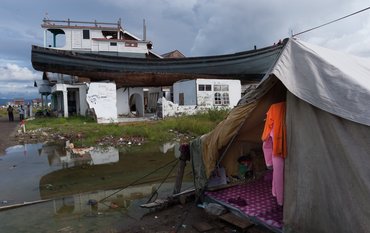2018 and 2019 were years with extremely low precipitation in many regions of the world, including Germany. The after-effects of this drought are still present, in the form of dry soils and low groundwater levels. A new product developed by NASA and the University of Nebraska using measurements from the satellite duo GRACE-Follow On (GRACE-FO) now provides regular global data on soil moisture and groundwater status for the first time. GRACE-FO is a partner project of NASA and the German Research Centre for Geosciences GFZ in Potsdam. With the help of the new global maps, dry periods can be understood and forecasted better. This can help agriculture, including in developing countries.
The researchers have developed new weekly maps of soil and groundwater moisture conditions as well as one- to three-month forecasts for the USA. While maps of current moisture conditions have been available for the USA since 2012, they are now available worldwide for the first time. “The global products are important because there are so few worldwide drought maps out there,” said hydrologist and project lead Matt Rodell of NASA’s Goddard Space Flight Center in Greenbelt, Maryland. “Droughts are usually well known when they happen in developed nations. But when there’s a drought in central Africa, for example, it may not be noticed until it causes a humanitarian crisis. So it’s valuable to have a product like this.”
The GRACE-FO satellite duo records the movement of water on Earth based on variations of the Earth's gravitational field. These variations can be determined from a high-precision distance measurement using microwave signals emitted by the two satellites flying behind each other. GRACE-FO is the follow-up project to GRACE. The two GRACE satellites had completed their mission in 2017 after 15 years of operation.
Frank Flechtner, who heads the GRACE-FO project at the GFZ, says: "We have been working on a similar, EU-funded project called G3P - Global Gravity-based Groundwater Product - since January and are in close contact with colleagues in the USA. The new data can also be used for mutual evaluation, because the individual data cover different aspects in certain areas".
Further information:



![[Translate to English:] Fire in a forest, smoke rising, aerial view from above](/fileadmin/_processed_/8/3/csm_2025_01_06_AdobeStock_415831729_5a0e6d50d3.jpeg)









![[Translate to English:] [Translate to English:] Abror Gafurov von dem Schriftzug "Welcome to Azerbaijan" und den UN und COP Logos](/fileadmin/_processed_/2/5/csm_2024_11_Baku_COP29_Abror_Gafurov_1042faec82.jpeg)


![[Translate to English:] Martin Herold standing in front of the library on the Telegrafenberg](/fileadmin/_processed_/c/d/csm_Martin_Herold_d385ee4dd9.jpeg)
![[Translate to English:] Many people are listening to a presentation in the GFZ lecture hall.](/fileadmin/_processed_/c/a/csm_1_Bild1_hell_b9c0e9f5ed.jpeg)






![[Translate to English:] Both scientists sitting on stools in front of a wall of books in the Telegrafenberg library](/fileadmin/_processed_/6/6/csm_Buiter_Castell_DORA_4_e87cb1ea18.jpeg)
![[Translate to English:] Gruppenbild mit 4 Personen](/fileadmin/_processed_/8/d/csm_20241017_GFZ-Emmerman-Medal-005_web_reinhardtundsommer_21a414fa4a.jpeg)






![[Translate to English:] Ice landscape with five red tents](/fileadmin/_processed_/8/9/csm_Zeltlager_auf_dem_Eis_Urheberin_Jenine_McCutcheon_5ced2d523b.jpeg)